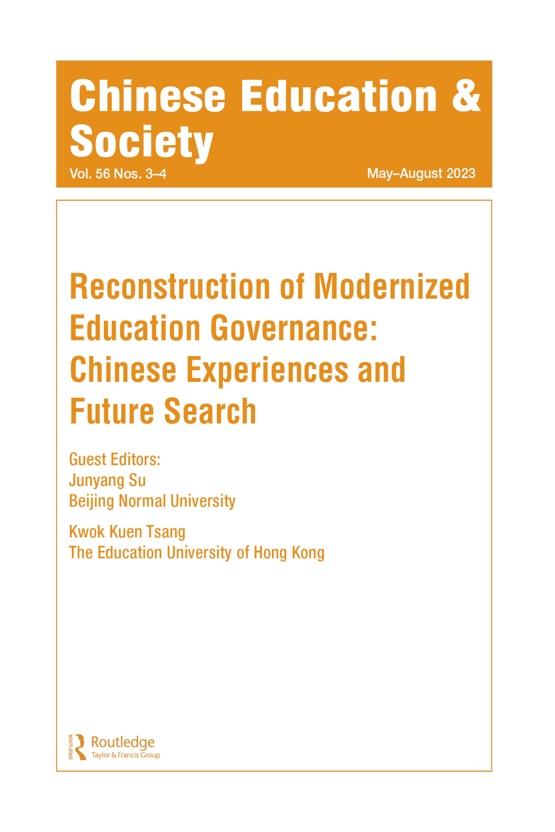Submit a Manuscript to the Journal
Chinese Education & Society
For a Special Issue on
Future, Love, and Modernity: Chinese Middle-class Parents’ Educational Anxiety
Abstract deadline
29 March 2024
Manuscript deadline
28 June 2024

Special Issue Editor(s)
Cheng Zhong, Ph.D., Assistant Professor,
Center for Sociology of Education, Nanjing Normal University
[email protected]
Ailei Xie, Ph.D., Professor,
School of Education, South China Normal University
[email protected]
Future, Love, and Modernity: Chinese Middle-class Parents’ Educational Anxiety
The Chinese middle-class parents’ educational anxiety is a hot topic in China’s mass media and has caught much scholastic attention in recent years. Terms like educational fever, “middle-aged old mothers” (Xu, 2022), “Jiwa” (firing up kids), and “Neijuan” (Involution) indicate parents’ experiences of childrearing anxiety. Previous studies have generated rich discussions on the causes and representations of educational anxiety. At a macro level, parents’ anxiety is associated with a Confucian emphasis on education, neoliberal education reform, a high-stake education system (i.e., National College Entrance Examination), a competitive educational environment, unequal distribution of educational resources, and so on. At a micro level, parents’ high educational aspirations, vanity, status panic, meritocratic mentality, and the influence of public media are discussed.
Attention to parents’ education anxiety can lead to vital advancement in many ways. When researchers and practitioners consider educational anxiety, they are invited to explore parents’ aspirations and imaginations of children’s future lives in a broader social and cultural context. Educational anxiety is a moralized way of expressing and practicing love in China. The love displays parents’ responsibility and, to some extent, is bitter and problematic. As Chua (2011) put it, “Chinese parents…override all of their children’s own desires and preferences” (p. 53). At a confluence of Confucian traditions, modernity, and modernization, parents’ anxiety is based on their perception of society’s risks, changes, and uncertainties. As regards, besides considering what individuals can do to relieve anxiety, it may be more important to ask what policymakers can do to build trust and construct stable future narratives (Dong, 2022). Educational anxiety is also associated with children’s achievement and performance. Policy focus needs to be turned from regulating parents’ behavior (e.g., school choice, excessive education consumption, etc.) to directing parents’ mentalities (Zhong, 2023).
While this special issue pays particular attention to China, it can derive lessons for global scholarship. Anxiety in education has gained growing interest in English literature (Doepke & Zilibotti, 2019; Ehrenreich, 2020; Zeidner, 2014), but most bypass various definitions of education anxiety. Education anxiety is understood as a fleeting and emotional experience. The social and cultural process of education anxiety is surprisingly neglected. The Chinese parents’ anxiety narratives can add new perspectives and approaches to understanding and exploring educational anxiety.
We seek contributions that offer fresh and interdisciplinary perspectives and diverse theoretical and methodological traditions. We mainly focus on, but not limited to, the following questions:
- What are the problems with the existing theoretical representations of educational anxiety? In what ways can we build provocative and different conceptualizations of educational anxiety?
- How to understand the Chinese middle-class parents’ educational anxiety in a social and cultural process? How do parents imagine and sketch their children’s future? What impact do neoliberalism, economic downward, pandemic, diploma inflation, unemployment, educational inequalities, policy changes, and educational reforms have on parents?
- How do parents’ educational anxiety influence their childrearing? How do parents’ educational anxiety impact the local schooling system, educational market, and policy implementation?
References
Chua, A. (2011). Battle hymn of the tiger mother. Bloomsbury publishing.
Doepke, M., & Zilibotti, F. (2019). Love, money, and parenting: How economics explains the way we raise our kidsPrinceton University Press.
Dong, H. (2022). Educational Anxiety among Metropolitan Parents: What They Fear and How They Suffer? An Analysis Based on Survey Data from Five Metropolitan Cities in China. Journal of Capital Normal University ( Social Sciences Edition)(5), 130-144+187.
Ehrenreich, B. (2020). Fear of falling: The inner life of the middle class. Hachette UK.
Xu, J. J. E. (2022). “Middle‐aged Old Mothers” in China: Childrearing Anxiety, Humor, and the Narrative Self. 50(1), 50-71.
Zeidner, M. (2014). Anxiety in education. In International handbook of emotions in education (pp. 265-288). Routledge.
Zhong, C. (2023). Seeking balance: Chinese middle-class parents’ choice imaginaries under Synchronous Admission Reform. International Journal of Educational Development, 96, 102699. https://doi.org/https://doi.org/10.1016/j.ijedudev.2022.102699
Looking to Publish your Research?
Find out how to publish your research open access with Taylor & Francis Group.
Choose open accessSubmission Instructions
Manuscripts should adhere to the journal's guidelines and word templates for formatting and citation. Authors are invited to submit their manuscripts as per the journal's usual submission policy. Please indicate that the submission is for the Special Issue on “Future, Love, and Modernity: Chinese Middle-class Parents’ Educational Anxiety”.
Submissions must be in Chinese or English.
Important Dates
Submission of abstracts: Due March 29, 2024
Invitation to submit full-length manuscripts: By April 15, 2024
Submission of invited full-length manuscripts: Due June 28, 2024
Peer Review Process: June to September, 2024
Expected Publication: Nov 30, 2024
The editors will review abstracts and invite authors to prepare manuscripts. Proposals are due February 23, 2024. Proposals for manuscript submissions should not exceed 800 words and should be submitted to [email protected] (cc to [email protected]).
The proposal must address and will be reviewed on the following five elements: objectives, theoretical framework, methods, results, and significance.
There is no word limit for final manuscripts. The authors invited to submit manuscripts will be notified by April 15, 2024, and will be expected to submit final manuscripts for peer review no later than June 28, 2024, to allow for peer review. Proposals must be blinded and not include any information that reveals the author’s identity. Notably, we also welcome high-quality works published in Chinese journals. Translation services will be offered for selected works.